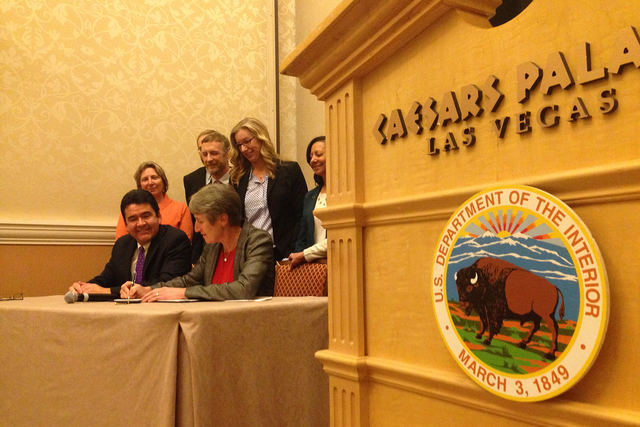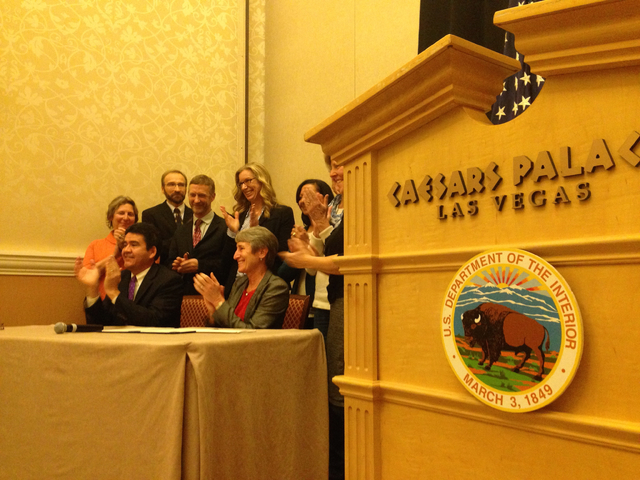Problems in California complicate negotiations to boost sinking Lake Mead
A multistate agreement aimed at shoring up Lake Mead can’t be finished until California finds a way to solve two major, long-simmering environmental fights.
That was the message from top water managers Thursday gathered in Las Vegas for the annual conference of the Colorado River Water Users Association.
For the past 18 months, Nevada, California and Arizona have been negotiating a drought contingency plan to keep Lake Mead from shrinking enough to trigger a first-ever federal shortage declaration and force Nevada, which receives most of its water from the Colorado, and especially Arizona to slash their use of river water.
Under the plan, Nevada and Arizona would voluntarily reduce use and leave water in Lake Mead when the surface of the reservoir falls to certain trigger points. Should the lake fall far enough, California also would take voluntary reductions, even though current law shields the Golden State from cuts to its share of the Colorado.
But water managers said disputes in California are holding up the deal.
Before they agree to store more water in Lake Mead, California’s largest river users want to know how much water they might have to forgo to protect endangered fish in the Sacramento-San Joaquin Delta or keep the Salton Sea from drying up, triggering an ecological disaster.
In recent years, the state’s largest municipal water agency, the Metropolitan Water District of Southern California, has seen its annual water deliveries from Northern California slashed or halted altogether to protect minimum flows to the Bay-Delta ecosystem amid harsh drought in the Sierra Nevada.
“If we don’t get water from Northern California and the Colorado River Aqueduct, Southern California goes belly up. We need both of those to function,” Metropolitan General Manager Jeff Kightlinger said during a keynote panel discussion at Caesars Palace.
Kevin Kelly, general manager of California’s Imperial Irrigation District, which has rights to more river water than Nevada, Utah and Wyoming combined, said his agency is “uniquely positioned to be the most help” to Lake Mead. But it can’t until a solution has been found to the “existential threat” posed to its customers by the declining Salton Sea.
“The State of California candidly has been asleep” on the issue, Kelly said. “We’re waiting for a more coherent response from our own state.”
Tom Buschatzke, director of Arizona’s Department of Water Resources, said his state needs the contingency plan, with its incremental water reductions, to stave off the larger federally mandated cuts.
“When the lake gets really low, and we start to get shortages of 1 million acre-feet or 2 million acre-feet … that’s something hard to deal with,” he said.
Meanwhile, the U.S. is in talks with Mexico to extend and expand an agreement over how the Colorado should be managed across the international boundary.
Under the existing treaty amendment, set to expire at the end of 2017, Mexico stores some of its annual river allotment in Lake Mead in exchange for U.S. water agency investments south of the border.
After two years of talks, the two countries are close to a new pact that would spell out Mexico’s share of shortages on the river, let it continue storing some of its annual river allotment in Lake Mead, and allow U.S. water agencies to invest in water-saving projects south of the border for a share of water that is saved.
John Entsminger, general manager of the Southern Nevada Water Authority, called on the Obama administration to get the deal done — or as close to done as possible — “before the inauguration.”
He said he isn’t worried about the talks breaking down under the new administration. He’s just trying to prevent a delay should the people at the table suddenly change.
“The concern is much more procedural,” he said. “We don’t see this as a partisan issue.”
Contact Henry Brean at hbrean@reviewjournal.com or 702-383-0350. Follow @RefriedBrean on Twitter.























